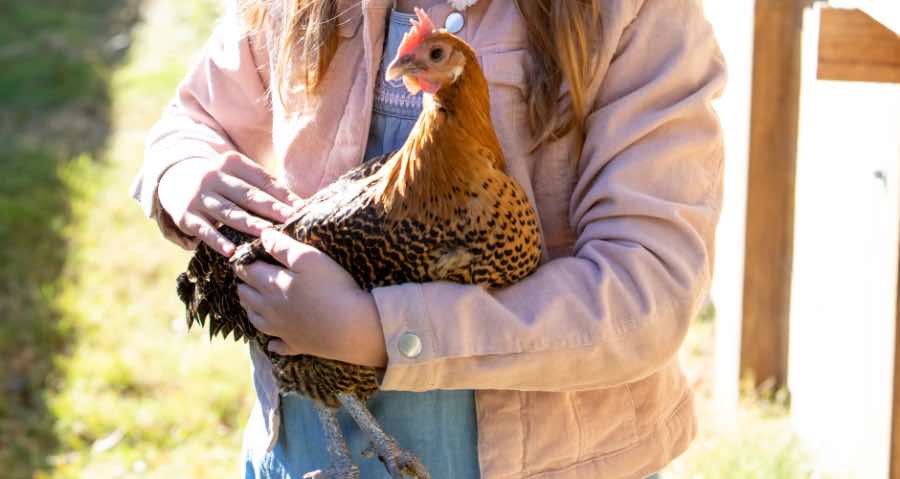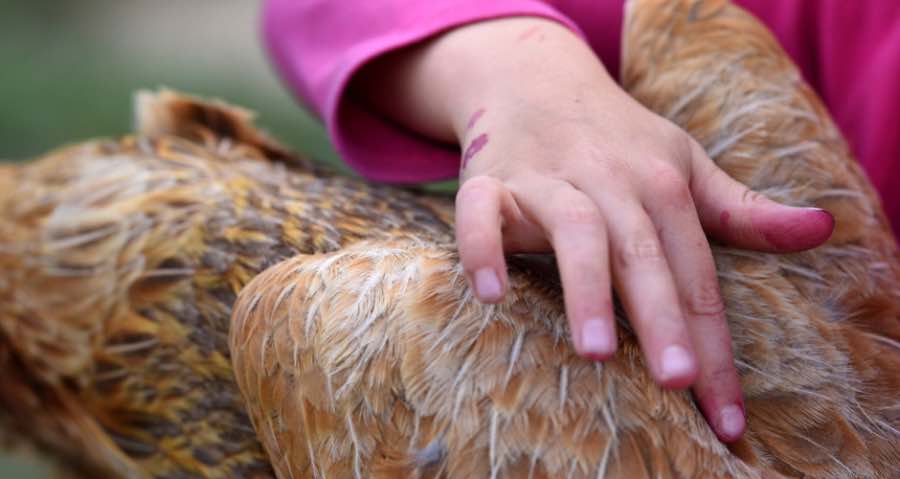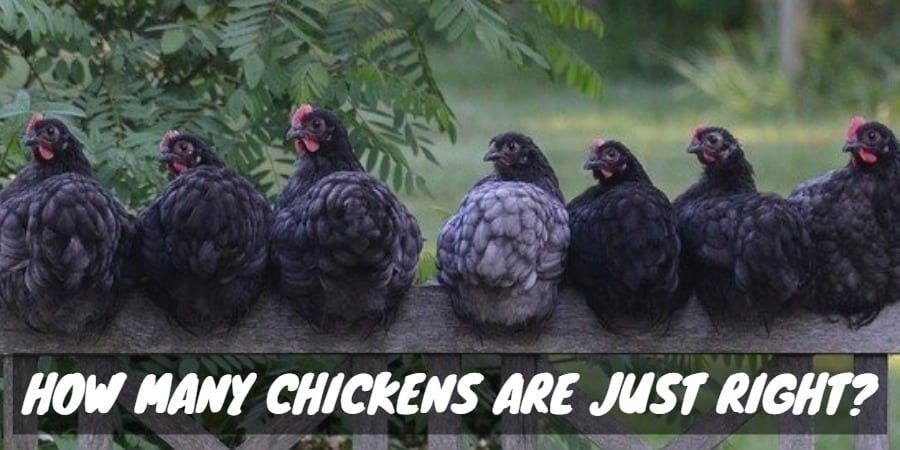Not always. But if you know how to handle them, you may build a special relationship with them. We hope this tutorial will tell you how.
Do Chickens Enjoy Being Touched?
In a world of constant need for consent, one might wonder, “Does my hen enjoy being pet?”
The short of the long answer is, it depends.
There are a number of factors to consider when determining if your backyard flock is for decoration purposes only or if they are true blue pets!
Some considerations are:
- Breed
- It’s true, certain breeds have a more favourable disposition when it comes to being treated as a backyard pet. Orpingtons, Silkies, even Rhode Island Reds all lend themselves to being “easy, starter chickens” because they are naturally more relaxed and easy to handle. Colombian Rock or Azura Blue hens, on the other hand, tend to be more skiddish and timid.
- Age
- As a flock matures, so does their tolerance for a gentle cuddle. Older hens tend to be more timid and gentle than adolescent chickens.
- Upbringing
- Raising your flock from chick will greatly increase their comfort with you thus improving the likelihood of being pet worthy hens.
- Gender
- Roosters don’t get a bad rap just because they crow. Because roosters are designed to defend the flock, they are less amiable to petting. Hens, on the other hand, are more likely to accept a solid rub down. NOTE: This does not mean that all roosters avoid human contact, my tiny Serama roo quiet enjoys being loved on.
- Familiarity with the petter
- Even the most timid hens may not tolerate stranger pets.
Now that we know a few key factors that contribute to whether your flock enjoys a good rub down, let’s discuss how you can improve your chances with the chicks.

Desire comes from the owner
Chickens may come off as skittish but your backyard hen probably enjoys a good rub down. If you’ve got backyard hens it’s likely you have a burning desire to hold them, cuddle them, and spoil them with all the treats.
It’s natural, they are fluffy, funny, and they lay breakfast, what’s not to love?
But does your hen appreciate your affection?
Building Your Flock’s Trust
Chicks
It should come as no surprise that it is easier to gain the trust of your flock when you start from scratch.
Raising your first flock from chick is a great way to get them used to being around humans and, specifically, to you.
Although chickens are not like ducks in the desire to imprint on their mother, providing regular attention and petting as chicks will result in a flock that adores affection.
If you are raising your backyard flock with children, it is a great idea to start with chicks. Allow your children to assist in feeding (hand feeding is a terrific way to get your chickens comfortable being touched), vent checks, and with cleaning the brooder. Involvement with chicks teaches your children to be gentle with the birds, to be comfortable with their movements and mannerisms, and to acquaint the flock with their friendly faces.
Older Hens
Not everyone wants to start from scratch when raising chickens, we understand that. There are a couple common options when starting a flock of pullets, ready-to-lay from the hatchery, or backyard homesteaders buy and sell.
Let’s discuss the differences and how you can improve the trust between man and bird with older, seasoned, hens.
Ready-to-lay Hatchery Pullets
Hatchery pullets will likely provide you with the most resistance when it comes to “allowing” you to pet them.
These hens are raised in difficult conditions (that may be putting it nicely) and have very little exposure to humans.
Hatchery hens tend to be skittish and poorly adjusted and will take a tender and consistent hand when it comes to handling them (conversely, you could be like my children and simply snatch them up, tuck them under you arm and wander around the yard with the hens until they love them!)
So, how can you improve the “cuddle me” factor of a hatchery hen?
- Provide ample treats.
- Much like, well any living creature, the way to a chickens heart is through its stomach. Being the treat person will greatly improve your chances of being able to cuddle your chickens.
- Spend time with them without attempting to make contact.
- Chickens are fascinating and humorous animals. They are simply a pleasure to watch. Spending time in the flock, whether you have an enclosed run or you sit in the yard while they free-range, will get the flock used to your smiling face. The more they see you they more familiar they become and before you know it, petting will ensue!
- Try the childhood method.
- If all else fails and you really want to pet a particular hen you may need to resort to the tried and true, “I’ll make you love me.” Gently pick up your hen and snuggle her under your arm while you take a stroll.
Remember, it’s a marathon, not a sprint, when it comes to gaining the trust of your hatchery hens.
Ready-to-lay Backyard Hens
I mentioned that there is usually a marked difference between backyard hens and hatchery pullets.
Backyard or homestead hens usually have more “socialization” than pullets from the hatchery. They are typically handled more, have a bigger variety of living conditions and ability to free range, and come face to face with their chicken tender on a regular basis.
Backyard pullets are normally more “pettable” and therefore more receptive to cuddles and caressing.
How to Pet A Chicken

Now that we have discussed preparing your chickens for all the love you wish to bestow on them, we should talk about how to best pet your chickens.
While chickens do have a few “favourite” places for petting, they enjoy a good scratch just about anywhere (save their tails and faces).
Favourite Petting Spots
Like every animal, chickens have a few key petting zones.
- Between the Wings
- Many chickens will enjoy a good scratch between the wings, think “shoulder rub”.
- Crop
- The neck and crop are a common place for chickens to enjoy a good scratching. Doing this on a regular basis will also help you to keep an eye on your hens health, an impacted or sour crop can be spotted early when you’re in the habit of checking your flocks crop.
- Under the Wings
- Just as your hen enjoys her back scratch, getting in under the wings is a common place for affection. This tender, warm, and nearly feather free area is the perfect spot for comforting your hen after a long day of foraging.
While these are the most common places to pet your chickens it is not the only way chickens enjoy affection.
Many hens appreciate a gentle comb rub. Familiarizing them with this makes it easier to treat your flock should they become injured.
In addition, if you have a particularly calm rooster, you may be able to gentle rub his comb and waddle. Similar to above, introducing your rooster to this type of touch makes it easier to attend to any injuries (including frostbite).
What Does It Mean When My Hen Crouches Down?
If you have a particularly affectionate flock you may have noticed your ladies crouch down when you come near.
This is a submissive behaviour similar to what they would do with a good rooster.
Yup, they are submitting to you surrogate ROO.
In these instances, give your hen a hearty back scratch and let them on their way. They love you, they want to know you’re in charge, and they are happy to be your favourite chick.
Why Should I Pet My Chickens?
Great question!
Can’t chickens just free range and be perfectly fine?!
Absolutely!
While there is nothing saying you have to pet your chickens, there are a number of benefits to raising human friendly hens.
Happy Hens
Just like physical contact has improved heath benefits for humans, the same is true for chickens.
Petting, combined with treats and general affection, improves the mood of your flock and provides stress relief for chickens. Not to mention, I have yet to see someone grumpy while petting a chicken so it’s practically science that holding a hen and scratching her back is pretty good stress relief for us as humans.
Monitor Flock Health
Being hands on with your hens on a consistent basis makes it easier to keep a finger on the pulse of your flock, pun intended.
Being able to comfortably handle your hens, whether it is checking their combs and crops, to assessing the health of their feet, it is important to be able to get hands on your hens without causing undue stress.
Hens that are handled frequently tend to have any health concerns identified sooner which makes the outcome of said concerns more favourable through early intervention.
EGGS!
We all know that happy hens lay healthy eggs but, did you know that happy hens also lay MORE eggs.
Hens that are relaxed, well cared for, and have a full cup of the happy hormone (serotonin) are more likely to lay on the high end of their range.

Conclusion
Most chickens love a good petting, whether you give them a rub under their wings or you become their surrogate roo, get out there and show your flock a little love. It’s good for them!




